23andMe’s Double Play: Making Science & Patients Partners
Pharm Exec profiles patient DNA partnering advocate 23andMe, which recently struck data deals with a pair of big Pharmas, thrusting the debate over personal genomics and patient treatment back into high gear.
Patient DNA partnering advocate 23andMe kicked off the new year with a double whammy, announcing a pair of data collaborations with Genentech and Pfizer. It's a precedent dogged by questions: is this a trend-the beginning of something big and blooming? What other firms in the life sciences will dip their toes in the consumer genomics company's re-contactable database? Is cross-pollinating with 23andMe destined to become a must-have for any aspirant to a stake in personalized medicine? Finally, aside from its prowess in cultivating partnerships, what does 23andMe have to teach the industry about putting patients at the center of the modern research-based enterprise?
Clicking through 23andMe's website and blog feels a bit like clicking through the vast emotional roller coaster of cable television: from the Hallmark Channel, to Style, to Discovery, and maybe mixing in a bit of Maury Povich-it's all about a family reconnected, or a quick lesson about blondes and redheads, mixed in with a DNA video while finding out who's the baby's real biological daddy, if you're lucky.
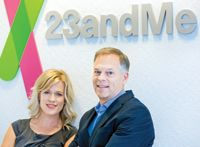
Andrew Page, president of 23andMe, and Emily Drabant Conley, the company's director of business development. (PHOTOS: JOSEPH SCHELL)
But without coming across as cynical, the sappy stories are real, and the individuals are learning about their ancestry across generations, a feat achievable with megabytes of data and staggering analytical fire power.
What's more powerful, in addition to connecting people to their ancestral stories, 23andMe is taking a circuitous route to connect them to something far more fundamental: their own health. And doing it in an interesting, educational, and interactive way.
The uplifting TV feel is more than just story telling. It's a portal enabling real people (who may be slightly more science literate and proactive than the average Joe) to step into the strange world of genealogy and genomes. And if they click that research-consent box, to get them beyond their family trees, 23andMe will transport its customers to the world of life science research and drug development, resulting in an aggregation of numbers that spell influence, with the potential to impact the healthcare industry in ways entirely unforeseen. The path also leads individuals and their genomes into yet unexplored jungles of personal data privacy, theft through hacking, and the profit motive that drives the big Pharma enterprise.
Double Deal
23andMe kicked off 2015 with an announcement that let everyone in on what the Mountain View, Calif.-based personal genetics company has been up to since it fell under the scrutiny of the FDA in 2013.
In an interview with Pharm Exec, Andrew Page, president, and Emily Drabant Conley, Ph.D., director of business development, stressed that the two disclosures would not be the last this year. In 2014, the company signed 14 deals and anticipates announcing several more this year, though not all will be made public.

The first announcement, on Jan. 6, is reported to earn the company $10 million upfront and may tack on $50 million if the company achieves certain milestones with Genentech/Roche. The goal is to identify new therapeutic targets for Parkinson's disease by generating whole genome sequencing data for roughly 3,000 people in 23andMe's Parkinson's disease community. 23andMe followed up on the Genentech deal by announcing an agreement with Pfizer on Jan. 12. The bulletin was timed for maximum buzz as it came on day one of the JP Morgan Healthcare Conference in San Francisco, a four-day affair known for industry deal brokering.
Though the release regarding the Pfizer pact does not disclose dollars, it promises to be wider reaching than the Genentech deal. 23andMe will allow Pfizer to access its "research platforms, including services and research portal analysis of 23andMe's genotyped population of over 850,000 individuals," according to the announcement. Eighty percent of the individuals in the database have granted the company research consent, it notes.
In addition to the broad platform agreement, the deal with Pfizer also includes a more narrowly directed mandate to enroll and genotype 5,000 people into a new lupus research community, which will integrate medical records and targeted bio-samples.
The two agreements illustrate just a portion of the spectrum of deals that 23andMe can make, noted Page. The two pacts are different in depth and focus. With Genentech, the collaboration is narrow, centered on Parkinson's disease. The deal with Pfizer provides the company with access to 23andMe's research platform, including services and Research Portal analysis of 23andMe's genotyped population who have consented to participate in research. As a part of the agreement, the companies will collaborate on certain genome-wide association studies, surveys, and clinical trial recruitment. One of these collaborations will be a longitudinal study to better understand the genetics of lupus. The remaining unannounced deals inked in 2014 promise to embody a fairly even split of narrow and broad collaborations, Page told Pharm Exec.
In addition to working with biotech and pharma companies, Page added that 23andMe's allies will also extend to include academia. The company expects to make several more announcements on these arrangements in 2015. Lastly, one of 23andMe's agreements is with a company in "another category," which should be announced in the near future, he said. Whether this deal is with a contract research organization (CRO,) a device or diagnostics firm, or something else entirely, the conclusion to be drawn is that quarrying 23andMe's heaps of data is emerging as a true source of competitive advantage for big Pharma.
The announcements seem substantial in scale considering 23andMe is still somewhat of an unknown to many in the industry. Its operations and offerings are just beginning to crystalize, and the disruptive potential across healthcare remains theoretical. Given the deals in place-and those yet disclosed-the industry now sees the 23andMe story as more than a pleasing narrative. Instead, companies are kicking the tires in anticipation of an exhilarating test drive.

Anne Wojcicki
Target: Big Pharma
23andMe has enjoyed the limelight thanks to its A-list founders, Linda Avey, Paul Cusenza, and Anne Wojcicki, the latter now separated from her billionaire Google co-founder husband, Sergey Brin. Its deep-pocketed financial backers include Yuri Milner, Johnson & Johnson Development Corporation, MPM Capital, The Roche Venture Fund, Google Ventures, and New Enterprise Associates. The association with Silicon Valley's financial elite has certainly helped it build credibility as an industry innovator. But since its launch in 2006, many leading opinion makers in healthcare have viewed 23andMe skeptically; questioning how a company pitching a superficial message around genomics linked to genealogy kits could ever impact the healthcare industry.
In fact, forging complex research agreements with biopharma firms has been a major part of the company's strategy all along, explained Drabant Conley. With the support of two biotech and pharma giants, the urge to partner means that 23andMe is positioning to do a lot more than simply sell genetic and genealogy services to the genome-literate mass consumer, at $99 a pop.
"We've been preaching since inception the impact that learning about genetics can have on the individual and on the research or target discovery process for pharmaceutical and biotech companies," said Page.
The agreements are a "natural outgrowth of what the company has been focusing on since our inception," said Page. "Stepping back, we first focused on engaging and empowering individuals around taking control of their own genome. With this engagement, the database grew, and as it grew we started to have statistically significant epidemiological cohorts of certain rare diseases for pharma and biotech to take an interest in," he explained. That's when 23andMe's deals started to be formulated. Early collaborations were small and geared to validation work, with the 23andMe's team of PhDs offering products designed to facilitate information exchange, answering questions posed by its customers in a highly collaborative and interactive way.
As the company ramped up its capabilities in 2013, the database became large enough (now with around 850,000 individuals and 80% consented into R&D testing activities) for the firm to categorize and automate its offerings so that it no longer needs any manual consulting service. However, the company still does a great deal of custom analysis and consulting. These more automated offerings are what 23andMe are starting to roll out now, Page said.
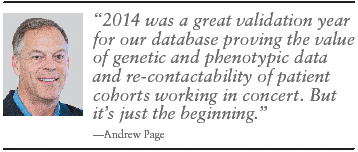
"What used to take months or years, or may have been impossible, can now be done very quickly with sophisticated searches," he explained. "2014 was a great validation year for our database proving the value of genetic and phenotypic data and re-contactability of patient cohorts working in concert. But it's just the beginning."
23andMe sees "individuals as partners" not study subjects. With some 650,000 partners opting in, the company can apply the largest data set of its kind to any number of platforms. Its research services also include the 23andMe Research Portal, which allows qualified researchers outside of 23andMe to run queries on de-identified, aggregate data. With this information, researchers can search for and potentially identify new associations between genes, diseases, and traits more quickly than through the traditional research model, according to the company.
23andMe opts for diversity in working with collaborators, including academics and scientists, non-profit organizations, and for-profit companies. By partnering with the greater scientific community, 23andMe's goal is to accelerate meaningful discoveries through the accessibility of its data. Building and maintaining this powerful research platform, safeguarding participants' data, and allowing researchers to access this resource for even more scientific discovery are core to the company's mission.
Even though 80% of 23andMe's data base population opted to sign research consent, many may not have grasped the fact that data from their saliva sample might be sold to companies like Pfizer. But the clear consent protocols and evident awareness of 23andMe about real diseases and the suffering, difficult-to-treat patient populations should help pacify those who have been critical of 23andMe on data privacy.
Not eye to eye: The FDA stir
Up to now, 23andMe's primary headline grabbing moments have highlighted its struggle with the FDA over just what it can tell its customers about themselves. In November 2013, the FDA sent the company a warning letter demanding it stop marketing its saliva collection kit and genome services, stating it was "intended for use in the diagnosis of disease or other conditions or in the cure, mitigation, treatment, or prevention of disease, or is intended to affect the structure or function of the body"-uses for which 23andMe had not gained marketing clearance or approval.
In its early days, 23andMe strove to be an interpretation platform across a bunch of different modalities, from ancestry to disease carrier status and health risk, explained Jason Bobe, director of the Sharing Lab in the Department of Genetics and Genomic Sciences of Icahn School of Medicine at Mount Sinai in New York. But that goal clashed with the FDA's authority to regulate genetic tests and health risk reporting.
Both criticism and support rained down on the company. Some have called the company out for its moxie in dealing with the FDA, claiming that the company's raffish approach to regulatory compliance would be its undoing.
Others support the 23andMe mission to get individuals involved in their own healthcare through greater knowledge of their own genomes. Scores of devotees petitioned for the FDA to allow the personal genomic service, both to encourage people taking action for their own health as well as those with a more libertarian bent that the government should let the firm operate, explained Mike Jones, a senior campaign director at Change.org. Additionally, a commentary in Nature in January 2014 called FDA's crackdown unwarranted with little evidence of damage to patients, stating the agency was "acting on the basis of speculations of potential harm rather than reported harm."
Following the FDA's forceful response letter, with which the company quickly complied, 23andMe said it would continue to provide "ancestry-related information and raw genetic data without any interpretation." 23andMe has continued to work with the agency on refining its test. Resolving the dispute is a top priority, the company states.
This February did offer a harbinger of détente with the agency as the company announced it had been granted authority to market the first direct-to-consumer genetic test under a novel devices regulatory classification. FDA will allow 23andMe to market the Personal Genome Service (PGS) for carrier status testing of Bloom syndrome through de novo classification, according to the Feb. 19 release.
Since the FDA put the skids on its personal genomics opt-in plan, 23andMe has struggled to walk a tightrope between public praise for its transparency and concern with the implications of this for protection of individual privacy. A stubbed toe occurred in September last year when Vox.com profiled a less-than-happy ending to a genealogical search conducted through 23and Me. Newly found familial connections might not be the joyous occasion we often envision. Just picture a call or email informing you of different parentage than you previously thought, or maybe your child turned out to have a different birth parent.
The article caused a change in strategy, which had been shifting to "giving people fewer warnings about the secrets they may unlock in their DNA." Instead, Wojcicki wrote customers that the company had erred, saying, "I do not think it was the right call to promise we would automatically opt-in those customers. Core to our philosophy is giving customers maximum choice and empowerment through data." The apology also included a promise to be more vigilant by creating a new position of company privacy officer.
23andMe followed through by hiring former federal privacy watchdog Kate Black, with the title of privacy officer and corporate counsel. In case you're wondering what kind of resume a privacy position might require, Black has extensive experience in the burgeoning field of healthcare IT and privacy. She was employed at the Office of the National Coordinator for HIT, U.S. Dept. of Health and Human Services, and prior to that, as health privacy counsel for the Center for Democracy and Technology in San Francisco.
Re-contacting & re-consents
"What excites me is the ability to take genomics to the masses. By providing education, the company is essentially providing genomic services attached to a bicycle on training wheels," quipped Bobe. There is great appetite from the public to be able to access this information at all levels, from people looking at their genomes strictly for genealogy, and, of course, it goes without saying that people want to tailor their backgrounds to obtain better, more effective therapies, said Bobe.
Even if there is a reticence on the part of some genealogy clients to check all boxes "yes", 23andMe is counting on the majority of its customers to stay interested enough to want to contribute to the expanding database.
In some cases where the company is working with a third party, like the deal with Genentech, 23andMe will go through a re-consent process. When an individual initially purchases and registers a genealogy kit, 23andMe has readied a specific and clear consent document that will establish that the individual agrees to participate in research, Page said.
23andMe is all about transparency to consumers, noted Page. It's all about consumer choice to participate or not. And they can change their mind at any point in the process. There's also institutional review board (IRB) oversight, which is essential, added Page. "The integrity with which we conduct research is paramount. Otherwise we don't believe the research partners contracting with us would be comfortable trusting mission critical research on any relationship with us."
Most patients are taking the stance of willing to be a small part of a large study, on the understanding that their identifying information won't be shared without additional consent, Page noted.
For the Parkinson's study with Genentech, all participants have consented, and the company will be re-consenting them for this program, he said. This will give 23andMe the opportunity to further engage around this active patient community, looking not just at the information it has, but to ask more questions and add greater detail. We'll also be sequencing whole genomes of roughly 3,000 of that study cohort and doing additional studies on them."
Page is optimistic that patients will largely agree to re-consent even if patients understand that their de-identified data is being shared with a third party pharma company. One reason for publicizing the Genentech deal is that, "we're hoping that the awareness of this study will cause our Parkinson's community to increase in size so that we then have even more participants in this study," said Page. This particular community has been around for a while. But it's unclear what the re-consent rates will be. "We hope it will be healthy, although something up to the 80 or 85% level might be on the high side," he noted.
According to experts interviewed by Pharm Exec, 23andMe is now positioned to be successful because patients are looking to be active participants in research. Getting involved and taking action in one's own health, or that of a loved one, is probably one of the "top five trends we are seeing at Change.org, "said Jones. Patients want more control and more say over decisions about their own health so they are demanding more information, Jones added.
"Everyone talks about big data and its enormous potential value. But what 23andMe's story shows is that there is also real value in relationships," said Bobe. "You really want both. The ability to have trusting relationships with individual patients, particularly around matters of health and medicine is huge," he said.
There is great value in being able to form a relationship with research participants and analyze them over time, as they go through their lives, take medications, experience disease and other health changes, rather than just a snapshot of a brief moment in a patient's life. It's akin to the power of social media to connect people, bring together groups, and to maintain trusting relationships over extended periods of time.
Research acceleration
What has been the interest level from pharma companies in getting involved with 23andMe? Who has approached the 23andMe for collaboration and who has been hesitant? The answers depend on the organizations and their ability to reform their processes, replied Page. Certain organizations have had breakthroughs using genetics in their own discovery processes, so building on that, a partnership with 23andMe is a natural step.
But 23andMe carries its own ambitious agenda in to these relationships: to be a disruptive force, accelerating innovation into virtually all aspects of drug development. The notion of 23andMe's introducing genetics into the research process is disruptive to the traditionally slow, procedurally dense, toxicity animal-based testing process of drug development, said Page. Given this bold pledge to disrupt and accelerate time to market, as well as the company's commitment to bolstering this with financial and scientific backing, there's little doubt there is interest from big Pharma and the biotech companies to bang down the door, at least to see what's on the other side.
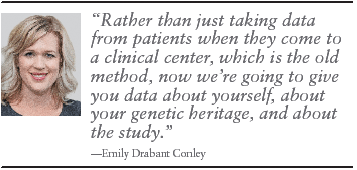
Some companies have seen the information assets that 23andMe has developed and have approached the company for that reason. In the case of Genentech, "we've been very publicly committed to Parkinson's and have built the largest Parkinson's community in the world by a significant margin, and they're intrigued by that," said Drabant Conley. Building these assets, as well as work the company has published, has been the impetus to opening many of these partnership doors.
For other companies, as in the context of the collaboration with Pfizer, they've been interested in developing drugs where there are challenges and limitations based on current methods and tools. They see 23andMe as greatly enabling some things that are very challenging to do in the current, more traditional clinical trial setting.
Clinical trials in some indications might define success by getting a drug to work in 30% of a patient population. But if you could figure out on the backend before launching a trial covering that 30% and not the other 70%, and thereby target a trial in patients with a specific symptom profile or genetic background, you can really increase your odds of success, explained Drabant Conley.
In the case of lupus, it's really not so much about target discovery, but about patient segmentation and understanding the underlying disease, she agreed. Many of these patients suffer because they try drugs that don't work, or that have really negative side effects. So being able to predict what drug might work precisely will be a win for these patients.
Lupus, with its heterogeneous patient population, wide-ranging symptomatology, and for which there have been very little drug success, may be the perfect example of a disease that needs to flip the script of traditionally drug development – hence the rationale for the new agreement with Pfizer.
Additionally, it can be hard to pull people into clinical research if they don't live near a clinical center and don't have the means to get there. But with the 23andMe platform, the goal is to make research accessible to anyone who wants to participate, even from home via the Internet, making research easier and faster, noted Drabant Conley.
Getting patients involved as more active participants can be truly disruptive to pharma's traditional research mindset. Given the resources online and the ability to convene people around a cause via social media, a new day is at hand for patients. It's fair to say that 23andMe can be a leading driver in this movement.
In the lupus study, individuals will receive 23andMe content for free, and they'll do it all virtually from home, said Drabant Conley. They will get updates about the study, and the Personal Genome Service will inform them about their own genetic background, she added. "I think that's the 'secret sauce' of 23andMe's research method. Rather than just taking data from patients when they come to a clinical center, which is the old method, now we're going to give you data about yourself, about your genetic heritage, and about the study and how it progresses, creating a rich database that benefits everybody and is more effective."
Industry converts
If there was uncertainty about 23andMe's approach, the Genentech and Pfizer announcements show that at least two big players are willing to take a shot.
The sale cycle to close the deals, which was once six to nine months, has been cut to close to two to four months, noted Page. "There's a general acceptance we're seeing in that pharma and biotech companies are going from being hesitant about incorporating genetics to realizing that they need to, because there is no more effective path toward understanding the biologic origins of disease."
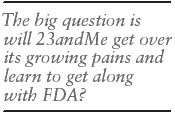
In addition to the big players, the company has exhibited the ability to play with the smaller kids on the block as well. One example that may not have had the same market impact as the Genentech and Pfizer deals, but still illustrates 23andMe's potential role in building data scale across scale is the firm's agreement to work with Reset Therapeutics to study circadian clock genes, according to a Jan. 7 press release.
23andMe enables smaller organizations to leverage its data that before now would have been cost prohibitive. "They can have access to our portal and incorporate our database into their research program, and it's almost a pay as you go setup," noted Page.
And if drug developers do in fact need to become aligned with a company offering a genomics database, 23andMe doesn't see much competition.
There are other databases out there, but they are limited to single areas, they are not re-contactable, they are static, they are not nearly as big, and do not have the phenotypic information, noted the executives.
"I don't think it makes sense for pharma to build this themselves," added Drabant Conley. "It's ideal because we have this big platform that many other companies can access. They don't have to recruit patients alone and reinvent the wheel."
Precision medicine fits
Looking ahead, the big question is will 23andMe get over its growing pains and learn to get along with FDA? If 23andMe's deals don't convince you that the company will get past its regulatory stumbles, just listen to the Commander in Chief. President Obama sure sounds like he's been drinking the same Mountain View water. Or maybe his speechwriter follows Anne Wojcicki's Twitter feed. Regardless, the President's Precision Medicine Initiative announced in his State of the Union address seems to fit awfully well with 23andMe's vision for "transformative" healthcare initiatives focused on individual awareness and empowerment.
In response to the President's declaration, 23andMe said in a statement, "We are excited to see the country moving toward recognition of the importance of engaging more Americans in genetics and advancing precision medicine. 23andMe is supportive of the goals outlined and looks forward to participating in the initiative."
"Having the blue print for your body seems to be an important piece of information that every doctor could have in the future," noted Bobe. "With the falling cost of sequencing a genome, and the new Precision Medicine Initiative, we should all anticipate greater access to this kind of data about ourselves coming much sooner than many realize."
We'll wait and see what more this will mean for 23andMe, but one guess is that the company will get over it's issues with Washington, DC. Or maybe Washington will get over its issues with 23andMe first.
Casey McDonald is Pharm Exec's Senior Editor. He can be reached at cmcdonald@advanstar.com.
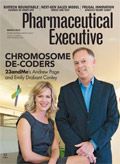
Addressing Disparities in Psoriasis Trials: Takeda's Strategies for Inclusivity in Clinical Research
April 14th 2025LaShell Robinson, Head of Global Feasibility and Trial Equity at Takeda, speaks about the company's strategies to engage patients in underrepresented populations in its phase III psoriasis trials.

.png&w=3840&q=75)

.png&w=3840&q=75)



.png&w=3840&q=75)



.png&w=3840&q=75)
















